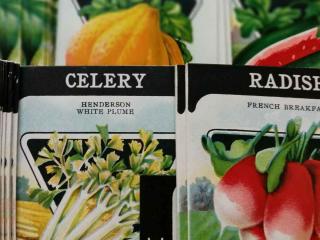

Sanitary crisis like coronavirus shouldn’t keep you away from your garden. Practically, a lockdown is an opportunity
to take even better care of your plants. Whether voluntary or imposed by the government, gardening is safe and will bear much more fruit than staying inside.
Turn couch potatoes into real potatoes!
However, expect changes to your gardening routine:
First, a note of caution regarding community gardens during lockdown. Many have set up schedules to reduce risks of people running into each other. The situation is different for professional gardeners and landscapers during coronavirus lockdown, too.
So you’re in your own garden, ready to get dirty. Soil is still wet because of spring rains. Weeds are, as always, the first to make the most of it!
Today is the perfect day to pull them out.
Note – for best results, pull out the entire root system.
Spring is the best season to renew and re-seed your lawn.
Once you’ve pulled weeds out, here are our tips to rejuvenate an old lawn.
You can still mow your lawn during lockdown.
There’s still time to catch up on pruning your roses, if you haven’t had the occasion yet.
Shrubs that have finished their winter blooming can also be pruned now.
And, of course, there are many types of hedges that can still be pruned nowadays.
Here, you can also go through these monthly garden task lists. There’s for sure a few things you can do in the garden to get a head start on December, January, and February garden work.
Your houseplants can benefit from proper repotting. It’s also time to prune some of the winter growth off, for instance on your Ficus ginseng.
If you see your leaf plants sagging and getting brown leaf tips, they’re lacking humidity in the air.
Excellent opportunity to involve your children in the garden. More than just a way to spend time having fun, it’s also a very healthy way to build up immunity and teach kids how wonderful nature is.
If you’re looking for fun gardening to keep kids busy during the virus quarantine, these few activities will surely help:
In many countries, eco-centers have closed their doors to the public due to sanitary precautions. Entry is restricted to people who are registered. You might have to check with your municipality to sign up, usually it’s a free service.
The alternative?
A number of garden stores are still open to the public, but sometimes only for animal and pet food. It’s the only thing they can sell!
Worry not!
Garden stores, nurseries, and horticulture centers have strict rules. They cannot sell plants such as trees, shrubs, bulbs or roses – in the store.
However, many now have online stores.
 It’s still perfectly possible to buy online and have them delivered.
It’s still perfectly possible to buy online and have them delivered.You can, as of now, purchase plants, seedlings and seeds on the Internet.
Granted, winter isn’t usually high season for plant fairs, farmer’s markets and flower shows, but nonetheless many events are officially canceled. This is important to protect people of all ages and their relatives that would otherwise have attended these events.
Even when working outdoors, try to minimize contact with neighbors and passers-by on the street.
My garden maintenance man visits several clients per day. Is it ok for him to come and work in my garden?
Hello Mavis, yes it is. As long as basic precautions are taken there’s absolutely no risk at all. For example, both clean your hands with soap and water before exchanging any items. As for tools, plants, and the like, the virus will die off in a matter of hours, so it’s perfectly possible to take a stroll in the garden a short while after the work has been done.
Thx, it’s very informative. Best wishes
If buying plug plants or plants in pots could they carry the virus (e.g. pots)- what precautions should be taken?
Also should gardening gloves be washed regularly in case they come into contact with virus – recycling garden waste bins, tools, shed door.
Hi Caroline, those are good questions. Studies have shown that the longest a virus can survive on surfaces is at most 5 days. A precaution would be to buy most non-living equipment like pots and such 5 days at least ahead of when you need to use them, and just let them sit in the boot of the car and/or storage area for 5 days.
For garden tools, a reasonable habit is to rub them with alcohol before and after use. But if you’re the only one gardening with them and no one else touches them, it’s enough to clean your own hands well before using them, and they shouldn’t be contaminated. Again, if gardening once a week, there’s almost no risk that the virus survives from one week to the next.
For plug plants and live flowers, keeping them for days in the car isn’t an option, so it’s best to bring them out and put them in a shaded spot where you can water without getting everything dirty. Small seedlings should still be planted right away or they’ll have a tough time growing back, but larger plants can easily wait for up to a week if need be.
Normally, garden stores are very careful and have staff wear gloves and masks and wash their hands often, so the risk of contamination isn’t that high.
Here are a few more ways to ensure physical distancing and protective measures in the garden.